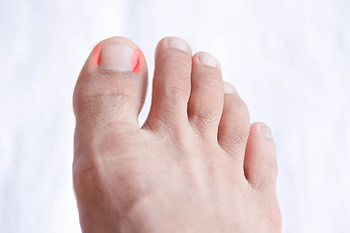Connect With Us
Blog
How to Deal With an Ingrown Toenail
Ingrown toenails (when the nail grows into the surrounding skin) are a very common malady that podiatrists treat, as oftentimes the toenail becomes very painful, inflamed, or even infected. You can help prevent ingrown toenails from developing by avoiding shoes that are too tight and trimming your nails straight across—and not too short. There are a couple of home remedies you can try to get relief from an ingrown toenail, such as soaking the toe in warm water mixed with either Epsom salts, apple cider vinegar, or a mild soap. Also, try applying an antibiotic cream to the nail several times a day and keeping it wrapped in a bandage to help reduce the chances of an infection developing. Wear comfortable, non-restrictive shoes that give the toes plenty of room. You can even try using an over-the-counter toe protector, which is a padded ring that cushions the toe and prevents it from rubbing against other toes or footwear. If your ingrown toenail becomes a chronic issue, the pain worsens, or you see signs of an infection, contact a podiatrist for more advanced treatment options.
Ingrown toenails may initially present themselves as a minor discomfort, but they may progress into an infection in the skin without proper treatment. For more information about ingrown toenails, contact one of our podiatrists of Foot & Ankle Associates of Maine. Our doctors can provide the care you need to keep you pain-free and on your feet.
Ingrown Toenails
Ingrown toenails are caused when the corner or side of a toenail grows into the soft flesh surrounding it. They often result in redness, swelling, pain, and in some cases, infection. This condition typically affects the big toe and may recur if it is not treated properly.
Causes
- Improper toenail trimming
- Genetics
- Improper shoe fitting
- Injury from pedicures or nail picking
- Abnormal gait
- Poor hygiene
You are more likely to develop an ingrown toenail if you are obese, have diabetes, arthritis, or have any fungal infection in your nails. Additionally, people who have foot or toe deformities are at a higher risk of developing an ingrown toenail.
Symptoms
Some symptoms of ingrown toenails are redness, swelling, and pain. In rare cases, there may be a yellowish drainage coming from the nail.
Treatment
Ignoring an ingrown toenail can have serious complications. Infections of the nail border can progress to a deeper soft-tissue infection, which can then turn into a bone infection. You should always speak with your podiatrist if you suspect you have an ingrown toenail, especially if you have diabetes or poor circulation.
If you have any questions, please feel free to contact our office located in Brunswick, ME . We offer the newest diagnostic and treatment technologies for all your foot care needs.
Several Types of Foot Pain
 There are so many different reasons why people experience ankle or foot pain. Sometimes pain may build up gradually from wearing shoes that do not fit properly, or pain can occur instantly due to a sudden injury like a car accident or fall. Pain in the feet can even be caused by underlying conditions like arthritis or diabetes. Other causes of foot and ankle pain may include gout, stress fractures, ankle sprains, and most commonly, Achilles tendon injuries. Gout is considered to be a form of arthritis and can develop due to genetic factors or from a diet that contains high levels of purines which are found in organ meats, certain types of fish, alcohol, and other sugary beverages. People who enjoy running may endure a stress fracture which is defined as a hairline fracture in the bones of the feet. Ankle sprains may occur just by stepping off a curb incorrectly or from direct impact during a sporting event. Nevertheless, ankle sprains typically require immediate attention to ensure they are diagnosed correctly and treated accordingly. Achilles tendon injuries are usually caused by a sudden increase of repetitive activity where too much stress is put on the tendon too quickly. This condition is also referred to as an overuse injury and athletes have a high risk for developing this disorder, as well as individuals with flat feet. If you or someone you know is living with foot or ankle pain, it is strongly suggested to seek the counsel of a podiatrist.
There are so many different reasons why people experience ankle or foot pain. Sometimes pain may build up gradually from wearing shoes that do not fit properly, or pain can occur instantly due to a sudden injury like a car accident or fall. Pain in the feet can even be caused by underlying conditions like arthritis or diabetes. Other causes of foot and ankle pain may include gout, stress fractures, ankle sprains, and most commonly, Achilles tendon injuries. Gout is considered to be a form of arthritis and can develop due to genetic factors or from a diet that contains high levels of purines which are found in organ meats, certain types of fish, alcohol, and other sugary beverages. People who enjoy running may endure a stress fracture which is defined as a hairline fracture in the bones of the feet. Ankle sprains may occur just by stepping off a curb incorrectly or from direct impact during a sporting event. Nevertheless, ankle sprains typically require immediate attention to ensure they are diagnosed correctly and treated accordingly. Achilles tendon injuries are usually caused by a sudden increase of repetitive activity where too much stress is put on the tendon too quickly. This condition is also referred to as an overuse injury and athletes have a high risk for developing this disorder, as well as individuals with flat feet. If you or someone you know is living with foot or ankle pain, it is strongly suggested to seek the counsel of a podiatrist.
Foot Pain
Foot pain can be extremely painful and debilitating. If you have a foot pain, consult with one of our podiatrists from Foot & Ankle Associates of Maine. Our doctors will assess your condition and provide you with quality foot and ankle treatment.
Causes
Foot pain is a very broad condition that could be caused by one or more ailments. The most common include:
- Bunions
- Hammertoes
- Plantar Fasciitis
- Bone Spurs
- Corns
- Tarsal Tunnel Syndrome
- Ingrown Toenails
- Arthritis (such as Gout, Rheumatoid, and Osteoarthritis)
- Flat Feet
- Injury (from stress fractures, broken toe, foot, ankle, Achilles tendon ruptures, and sprains)
- And more
Diagnosis
To figure out the cause of foot pain, podiatrists utilize several different methods. This can range from simple visual inspections and sensation tests to X-rays and MRI scans. Prior medical history, family medical history, and any recent physical traumatic events will all be taken into consideration for a proper diagnosis.
Treatment
Treatment depends upon the cause of the foot pain. Whether it is resting, staying off the foot, or having surgery; podiatrists have a number of treatment options available for foot pain.
If you have any questions, please feel free to contact our office located in Brunswick, ME . We offer the newest diagnostic and treatment technologies for all your foot care needs.
Abnormalities in the Feet Can Indicate Other Issues
 While the feet have a variety of functions, issues with the feet can also indicate issues in a variety of other parts of the body. Because of this, podiatrists can often be the first doctors to notice an issue. For example, feet that are too cold, or are blue in color, can indicate circulation problems in the rest of the body. Swollen feet can sometimes indicate heart disease or high blood pressure. The toenails can also indicate a variety of issues. Changes in toenail color can be signs of issues in the lungs, heart, kidneys, or liver, and it can even be a sign of diabetes or an infection. If you are noticing any abnormalities in the feet, consult with a podiatrist to make sure there aren’t any underlying issues.
While the feet have a variety of functions, issues with the feet can also indicate issues in a variety of other parts of the body. Because of this, podiatrists can often be the first doctors to notice an issue. For example, feet that are too cold, or are blue in color, can indicate circulation problems in the rest of the body. Swollen feet can sometimes indicate heart disease or high blood pressure. The toenails can also indicate a variety of issues. Changes in toenail color can be signs of issues in the lungs, heart, kidneys, or liver, and it can even be a sign of diabetes or an infection. If you are noticing any abnormalities in the feet, consult with a podiatrist to make sure there aren’t any underlying issues.
When dealing with systemic disease of the feet, it is extremely important to check the affected areas routinely so that any additional problems are caught quickly. If you have any concerns about your feet and ankles contact one of our podiatrists from Foot & Ankle Associates of Maine. Our doctors will assist you with all of your podiatric needs.
Systemic Diseases of the Feet
Systemic diseases affect the whole body, and symptoms usually are displayed in the feet. This condition can make a patient’s ability to walk unbearable. Systemic diseases include gout, diabetes mellitus, neurological disorders, and arthritis.
Gout – is caused by an excess of uric acid in the body. Common symptoms include pain, inflammation, and redness at the metatarsal/phalangeal joint of the base big toe. Gout can be treated by NSAIDs to relieve pain and inflammation, and other drugs that lower the acid levels in the body.
Diabetes mellitus – is an increase in the level of blood sugar that the body cannot counteract with its own insulin. Failure to produce enough insulin is a factor in Diabetes.
Diabetes of the Feet
Diabetic Neuropathy – may lead to damaged nerves and affect the feet through numbness and loss of sensation.
Peripheral Vascular Disease – can restrict the blood flow to the feet, and often times lead to amputation of the feet.
If you have any questions please feel free to contact our office located in Brunswick, ME . We offer the newest diagnostic and treatment technologies for all your foot and ankle needs.
What Causes Heel Pain?
 Heel pain can have a wide variety of causes, but the location of the pain can help to guide a proper diagnosis. Pain along the bottom of the foot can be caused by plantar fasciitis, heel pad syndrome, plantar warts, calcaneal stress fractures, nerve entrapment, or a neuroma. Pain in the middle of the foot can be due to peroneal tendinopathy, sinus tarsi syndrome, or tarsal tunnel syndrome. Pain in the back of the foot can be caused by Sever’s disease, Achilles tendinopathy, or a Haglund deformity. Seeing a podiatrist is the first step to healing your heel pain. A podiatrist will be able to examine your heel, ask questions about your current symptoms and medical history, and perform the tests necessary to diagnose and treat your heel pain.
Heel pain can have a wide variety of causes, but the location of the pain can help to guide a proper diagnosis. Pain along the bottom of the foot can be caused by plantar fasciitis, heel pad syndrome, plantar warts, calcaneal stress fractures, nerve entrapment, or a neuroma. Pain in the middle of the foot can be due to peroneal tendinopathy, sinus tarsi syndrome, or tarsal tunnel syndrome. Pain in the back of the foot can be caused by Sever’s disease, Achilles tendinopathy, or a Haglund deformity. Seeing a podiatrist is the first step to healing your heel pain. A podiatrist will be able to examine your heel, ask questions about your current symptoms and medical history, and perform the tests necessary to diagnose and treat your heel pain.
Many people suffer from bouts of heel pain. For more information, contact one of our podiatrists of Foot & Ankle Associates of Maine. Our doctors can provide the care you need to keep you pain-free and on your feet.
Causes of Heel Pain
Heel pain is often associated with plantar fasciitis. The plantar fascia is a band of tissues that extends along the bottom of the foot. A rip or tear in this ligament can cause inflammation of the tissue.
Achilles tendonitis is another cause of heel pain. Inflammation of the Achilles tendon will cause pain from fractures and muscle tearing. Lack of flexibility is also another symptom.
Heel spurs are another cause of pain. When the tissues of the plantar fascia undergo a great deal of stress, it can lead to ligament separation from the heel bone, causing heel spurs.
Why Might Heel Pain Occur?
- Wearing ill-fitting shoes
- Wearing non-supportive shoes
- Weight change
- Excessive running
Treatments
Heel pain should be treated as soon as possible for immediate results. Keeping your feet in a stress-free environment will help. If you suffer from Achilles tendonitis or plantar fasciitis, applying ice will reduce the swelling. Stretching before an exercise like running will help the muscles. Using all these tips will help make heel pain a condition of the past.
If you have any questions please contact our office located in Brunswick, ME . We offer the newest diagnostic and treatment technologies for all your foot and ankle needs.

